
![]()
The Memoirs of Stockholm Sven
Nathaniel Ian Miller
“To each side, ice accumulated in pinched slag heaps. The crevasses must have been terrible indeed, and I shuddered at the thought of peering into the void of one. A cold exhaled breath from some deep place where the world knew only freezing, crushing, grinding, and time measured in millennia.”
As WWI ravages Europe, Sven Ormson departs his home country in search of peace. The city of Longyear, one of the world’s northernmost settlements, brings him nothing but disfigurement and ostracization. His determination to live alone in the frozen wilds of the Arctic is aided by a handful of individuals who slowly become his new, if absent, family. Miller’s fictionalized memoir of a real man explores the trials and joys of connection in a world where most rely only on themselves.
Lately I’ve been gravitating toward quieter, character-focused stories, and this one fits the bill perfectly. Getting to know Sven was a pleasure, and I enjoyed seeing his slow transformation from wanting to be totally alone to realizing that he may need his found family after all. Setting this story in the Arctic was a great move on Miller’s part — nothing compounds the feeling of isolation like being alone in a place where “time [is] measured in millennia.” I have small quibbles with plot points in the final third of the novel, but otherwise found it engaging and very much worth reading.
Pick this up if you like quiet character studies.
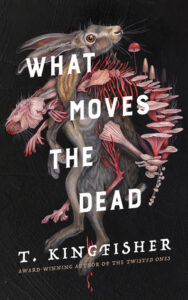
![]()
What Moves the Dead (Sworn Soldier #1)
T. Kingfisher
Book Riot 2025 Read Harder Challenge: Read a work of weird horror
“Evil, Roderick had said. But it wasn’t evil that I was seeing here. It was alien, a monstrous alienness so far removed from what I understood that every fiber of my being screamed to reject it, to run, to get away.”
Alex Easton arrives at their friends’ home to discover the house and its occupants on the verge of collapse. Madeline Usher is gravely ill, her brother Roderick is overcome by melancholy, and the local flora and fauna are behaving strangely. Now it’s up to an American doctor, a local mycologist, and Alex to solve a bizarre mystery before the House of Usher falls forever.
Just when you think it can’t get weirder than Edgar Allan Poe’s original short story, along comes T. Kingfisher. Whether it’s The Last of Us or Mexican Gothic, creepy fungus is in vogue right now; it was surprising to see such a popular topic covered in a new horrifying way. I don’t know that the focus on gender fluidity and alternate reality pronoun lessons added anything to the tale, but I like Alex as a character, particularly their dark/quippy sense of humor. The story kept me on edge, and the final reveal gave me the shivers and something to keep me up at night.
Give this a try if you like your Gothic novels heavy on body horror (and I guess mushroom factoids).
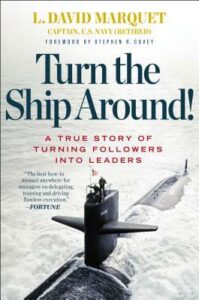
![]()
Turn the Ship Around! A True Story of Turning Followers Into Leaders
L. David Marquet
“A vast untapped human potential is lost as a result of treating people as followers.”
For most people, experimenting with the chain of command aboard a nuclear submarine feels like a bad idea. For David Marquet it’s ideal — if he can give the men on the Santa Fe additional control, competence, and clarity, then it’s possible to do in any organization. Turn the Ship Around! details the efforts Marquet and his crew implemented, and shows how what they learned can be used by leaders in any industry.
I don’t read many business books these days because they all seem like an echo chamber of rubbish. Marquet’s book has bucked that trend by actually giving me useful things I can try to incorporate into my job as a manager. I appreciated the general theme of pushing decision making responsibilities “down the ladder” and making sure those folks have the training, support, and context they need to make good choices.
A good book for managers/leaders looking to improve their teams.
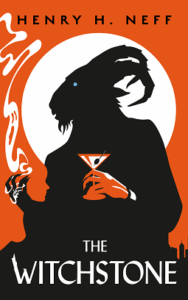
![]()
The Witchstone
Henry H. Neff
“On days like this, he simply loved being a demon. Within the hour, he would change his mind.”
As one of Hell’s nepo babies, Laszlo the demon is content to enjoy Earth’s pleasures while ignoring his responsibilities as a Curse Keeper. The Drakeford Curse has held firmly for centuries, and he sees no reason to rock the boat. But when a ruthless new manager comes onboard, Laszlo is given an ultimatum: get his numbers in the green or be destroyed. Now he’s off to Nowheresville to convince Maggie and George, the latest in the Drakeford line, that the curse can be broken. He hopes it’ll be a quick in-and-out, but soon discovers something in the Witchwood that may have the power to destroy — or save — them all.
Who says breaking a centuries-old curse can’t be terrifying and fun? I loved joining Maggie in the race to discover the truth, and was on pins and needles wondering how (or if!) Laszlo would be able to worm his way out the corner he was backed into. The curse became its own kind of character, and I thought the author did a great job of weaving into a larger story. There’s too much monologuing from a few too many characters who Know All the Things and the conclusion felt too open-ended for a standalone novel, but overall I had a great time.
Check this out if you like dark humor, nail-biting adventure, and plucky heroes (and you don’t have trypophobia).
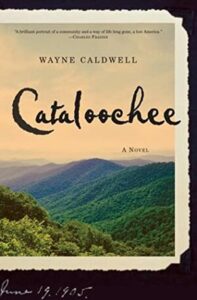
![]()
Cataloochee
Wayne Caldwell
Book Riot 2025 Read Harder Challenge: Read a book based solely on its setting
“He leaned the shovel against the porch and sat like a lizard, soaking in sunshine. A yellowhammer spiraled around a dead maple limb, alternately calling and pecking. After a morning rain, even yard dirt smelled rich.”
The Cataloochee Valley of North Carolina is home to families who have spent years making the land their own. Three generations of settlers want nothing more than to live alone in peace, but they’re not the only ones who recognize the beauty of the Great Smoky Mountains. As civilization creeps ever nearer, old wounds fester and long-standing feuds result in violence that threatens to tear the community apart.
As a descendant of Appalachians I can attest that they are unique, even among Americans. It’s not surprising that the stories told about them focus on the unique challenges they face: hard labor, tragic loss, addiction, abuse, and an outside world that wants to take what they’ve fought so hard for. Caldwell’s prose is evocative, to the point where it gets in the way of the story; it was only on my second read-through, once I knew where the plot ended, that the journey made sense and I could pick out the interesting foreshadowing. There are so many characters and tangents that I couldn’t keep it all straight, or figure out what was the main vs. side plot.
A good choice for fans of Wendell Berry and Marilynne Robinson.
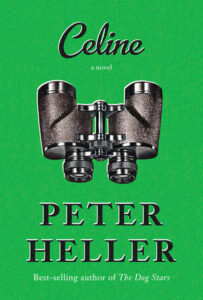
![]()
Celine
Peter Heller
Book Riot 2025 Read Harder Challenge: Read a staff pick from an indie bookstore
“She thought that one might not make a dent in the Great Sadness, but one could help make another person whole.”
68-year-old Celine Watkins understands loss. It’s why she’s a PI for missing persons cases rather than cheating husbands or embezzlers. Her latest case is so cold it’s nearly glacial: the disappearance of a famous nature photographer in the 1970s. The files say he was killed by a bear in Yellowstone National Park, but his daughter Gabriela suspects a cover-up. As Celine and her husband Pete wade deeper into the investigation, it becomes clear that there’s more to this case than meets the eye — and that someone else wants it to stay on ice.
As I write this, I realize that Celine is what I wanted Cataloochee to be: a book that balances evocative writing with a clear, interesting plot. Heller clearly appreciates and wants to share the beauty of the region (Wyoming), but keeps the plot clear while also throwing in tantalizing backstory details about the main character that made my ears perk up. While I find some aspects too unbelievable, I enjoyed meeting Celine and watching her piece together the truth.
Great for mystery fans and those wanting to get a sense of the nature and culture of the Yellowstone area.
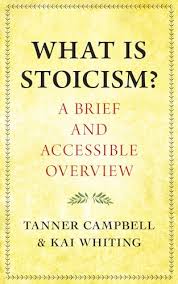
![]()
What is Stoicism? A Brief and Accessible Overview
Tanner Campbell & Kai Whiting
“Easy to read, accessible, and engaging while not dumbing down the critical and often misrepresented aspects of Stoicism.”
A comprehensive yet comprehensible summary of the foundations of Stoicism, including its origins and core tenets.
No matter how much I’ve studied a subject, it’s important to get back to the basics now and then — especially when it comes to Stoicism, whose theory and practice is inextricably linked. Campbell and Whiting lay out things clearly without shying away from more complex concepts like Logic and the thorny issue of the Stoic G(g)od. It’s a masterclass in summarizing a 2,000-year-old practice in just 120 pages. I originally grabbed this on audio, but I’m going to pick up a hard copy so it’s easier to reference in the future.
Pick this up if you’re new to Stoicism and want an approachable review, or if you’re a long-term practitioner who wants to revisit the basics.

![]()
The Omnivore’s Dilemma: A Natural History of Four Meals
Michael Pollan
“But imagine for a moment if we once again knew, strictly as a matter of course, these few unremarkable things: What it is we’re eating. Where it came from. How it found its way to our table. And what, in a true accounting, it really cost.”
In 2006 author Michael Pollan decided to write a book about the question that echoes around the world every evening: “What should we have for dinner?” Almost 20 years later his research and writing continues to challenge the way farmers, industry, and consumers approach what — and how — we eat.
This book has been floating around my periphery for years, but I avoided picking it up because I knew it would make me want to change my family’s eating habits in ways that weren’t possible. It’s only now (when I have more money and live near a large city that makes it feasible for local producers to survive) that reading a book like this could be anything other than frustrating and depressing. I agree with his premise that it’s better for animals and the Earth to eat meat sourced from local/non-industrial producers; the fact that the meat is more expensive means we’ll eat less of it overall, which is probably also a good thing for the world.
Some reviews complain that the book takes too long to get to the point, and focuses on some of the wrong things. I think that’s a reflection of the book’s age rather than its content. Pollan’s book was groundbreaking in 2006, but these days the details and arguments about feedlots, slaughterhouses, pesticides, overproduction, industrial vs. organic, and even foraging are much more commonplace. It was also published before there was widespread recognition of the prohibitive expense of organic meat production, food deserts, and other systemic issues that make it harder for most people to eat more sustainably (even if they want to). Fortunately it looks like Food, Inc. 2 (the 2023 sequel to Food, Inc.) might be recent enough to take these newer perspectives into account.
Only read this if you’re able and prepared to make changes to your dinner (and breakfast and lunch) menu.

![]()
Maine
J. Courtney Sullivan
“…even if there was no God there was always the ocean — before you and after you, breathing in and out for all eternity.”
Three acres of seaside land have been a summer haven for the Kellehers since the 1940s. A lot of history echoes through the homes they’ve built, not all of it happy. Strained relationships decades in the making have kept the entire family from gathering for years, until one summer when three generations of Kelleher women are tossed together by a series of unforeseen events. Maggie faces a semi-unplanned pregnancy, sisters-in-law Kathleen and Ann Marie see each other as the enemy, and matriarch Alice feels her terrible past encroaching on what little future she has left. This contemporary drama is a quiet exploration of relationships, generational trauma, and how irrational love can hold a family together even as it’s falling apart.
I read Sullivan’s The Engagements years ago and loved her approach to storytelling. For me the excitement of that novel came from her deep exploration of characters who are flawed and trying in various ways to live the lives they want while chafing against the expectations forced upon them by others. Maine continues that trend (although I guess it’s the other way ’round, since Maine was published first). The main characters are complex, neither perfect nor inexcusably bad. I identified with each of them in different ways, and hoped they would be able to figure out how to forgive each other. Some readers found the ending too ambiguous, but I thought it was done well — it leaves things open to the reader’s interpretation, just like everything else in the novel. This would be a great book club read.
Put this on your TBR if you like introspective contemporary dramas where the setting is just as important as the characters.
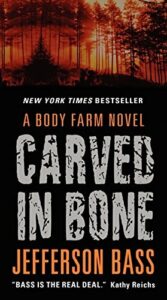
![]()
Carved in Bone (Body Farm #1)
Jefferson Bass
“I remembered a line from Garrison Keillor, whose public radio show UT’s NPR affiliate had broadcast for years: ‘Life is complicated, and not for the timid.’ Amen to that, brother, I thought. Amen to that.”
As the head of the University of Tennessee Anthropological Research Facility (better known as the Body Farm), Dr. Bill Brockton is intimately familiar with death. He’s seen almost everything, so he’s taken aback when a uniquely preserved body is found in a cave near a remote mountain community. Cooke County was established prior to the Civil War, and its isolated population has spent several centuries living hand-to-mouth and nurturing grudges. As Brockton’s investigation threatens to bring secrets (including his own) to light, it becomes clear that someone will do anything to make sure this mystery goes unsolved.
I finished out the month with my go-to comfort genre: murder/thriller. The main character was interesting, and there was a nice mix of adventure and science. The story was just twisty enough to keep me guessing, and the final reveal made me shudder. I noticed a couple wobbles on the audio (the pronunciation of “Appalachia” varied, and the southern accent is hard to get right in general), but breezed through and enjoyed the experience. The only aspect that took me out of the story was some dated commentary on women and overweight bodies — a risk you take when you pick up a book published in the early 2000s.
A promising start to a semi-true ten-book thriller series.
Photo by Ben Mirzaei on Unsplash






